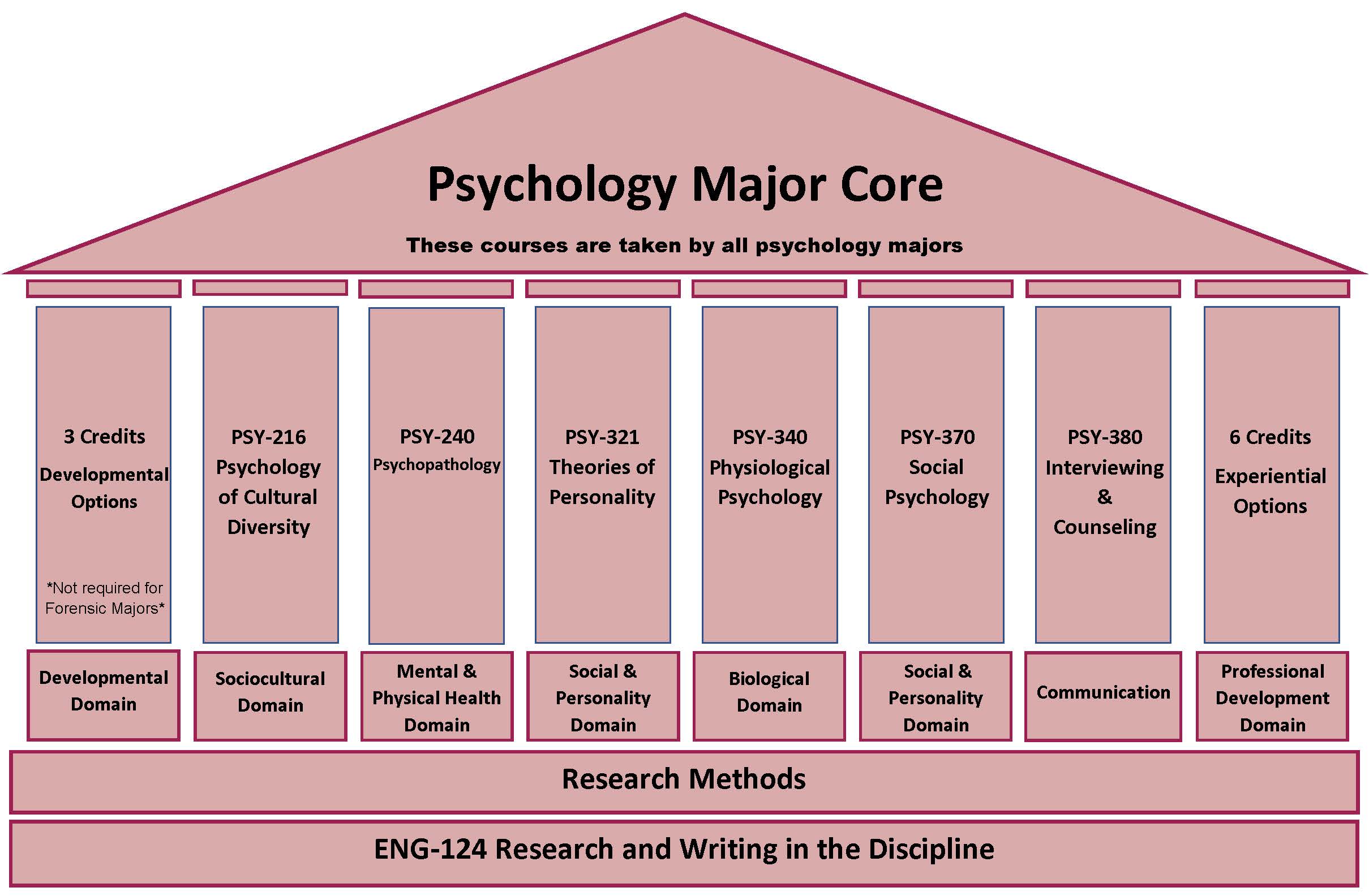Psychology Major Core
Psychology Core
The psychology major core courses have been aligned to provide a consistent foundation within the psychology pathway. All of the psychology pathways include a set of psychology core requirements (33 credits) consistent across all programs, with the exception of Forensic Psychology. These courses are organized by relevant knowledge domains of an undergraduate psychology education. These domains are outlined by the American Psychological Association (APA) and help to ensure that students are exposed to the core content areas within the field.

With this foundation of core psychology courses, all psychology students will be exposed to the recommended broad-based perspective of the field. This design provides consistent requirements for all psychology majors and concentrations, allowing for increased flexibility and reducing the risk of credit loss should a student choose to change within the psychology pathway.
Student Choice
Within each knowledge domain, where appropriate multiple options are available, students are provided flexibility as they select from a list of approved courses to fulfill particular requirements, such as the 3-credit developmental requirement and the 6-credit experiential learning requirement.
Developmental Options (3-credits) include the following:
PSY-205 Child Development
This course is a study of developmental changes from birth through 12 years old. Prenatal and neonatal issues are also discussed. Physical, emotional, social, and cognitive growth are explored at each age. The dominant theories of development are examined, as well as contemporary issues relating to childhood and parenting.
PSY-206 Adolescent and Adult Development
This course surveys how people develop and change from the onset of adolescence through late adulthood. Different theoretical perspectives and contemporary information relating to the physical, social, emotional, and cognitive realms are examined.
PSY-209 Growth and Development (Lifespan)
This course focuses on human growth and development over the lifespan. Theories related to physical, cognitive, social and personality across the lifespan will be explored. Life-changing health conditions and treatments are discussed with regard to potential psychological and social impact that these conditions and treatments may have on children, adolescents, adults, and health-care givers within the community.
Experiential Options (6-credits) include the following:
PSY-285 Psychology in the Field
This course will cover the broad discipline of psychology and its subspecialty areas within the field; career opportunities available in the field and educational requirements for field entry; graduate program exploration; and practical issues confronting professionals in psychology and related occupations. Through research, self-reflection and weekly networking activities, students will be introduced to the wide range of possible careers in psychology, while exploring their own academic and career goals based on their personal interests, strengths, and skills. Students will explore the benefits of professional organizations, networking, and the value of lifelong learning and professional development. Whether students are planning to attend graduate school or seek employment upon graduation, this course will explore what they can do to increase their chances of success in their chosen career path.
PSY-400 Psychology Capstone
In the psychology capstone, students are provided with the opportunity to synthesize knowledge, skills, and awareness acquired throughout their program into a community based project. During this course, students will demonstrate initiative and leadership by developing a major integrative project on a topic related to their professional goals. The course provides an opportunity for students to demonstrate communication skills, application of knowledge, critical thinking, sensitivity to ethics and diversity, and an appreciation of research that has been acquired during their undergraduate education.
PSY-495 Independent Research
Students in all majors and programs are encouraged to undertake special research projects, scholarly activities, or creative works under the guidance of a faculty mentor. Students may submit proposals for individual grants to support their research. Grant money may be used to purchase items necessary to conduct the research including supplies, materials, journals and publications, approved travel, museum admission, conference attendance, et cetera. The typical maximum amount that can be awarded per project is $500. Projects for undergraduate students may carry academic credit from one to three credits at both the lower and upper levels. Projects for graduate students may also have credit attached. Grant recipients are required to present their findings at the next applicable Bay Path Academic Achievement Day.
PSY-498 Psychology Internship (3 credits)
Students receive supervised training from practicing professionals normally during the final semester of the fourth year. Learning is achieved through observation and/or direct participation. Students are placed appropriately in settings that relate to their individual and educational career objectives. Sites may include public educational facilities, human services agencies, mental health clinics, and law enforcement and criminal justice agencies. (This course is graded Pass/Fail.)
PSY-499 Psychology Internship (6 credits)
Students receive supervised training from practicing professionals normally during the final semester of the fourth year. Learning is achieved through observation and/or direct participation. Students are placed appropriately in settings that relate to their individual and educational career objectives. Sites may include public educational facilities, human services agencies, mental health clinics, and law enforcement and criminal justice agencies. (This course is graded Pass/Fail.)
WEL-440 Leadership in Practice
This interdisciplinary capstone course is designed to give senior-level students an opportunity to demonstrate their leadership, communications and technology skills through active engagement in a self-directed change project. Building on assignments completed in previous courses, students are responsible for designing, implementing and evaluating an experiential learning project that draws on their talents, interests, strengths and skills to facilitate change in a personal, family, organizational and/or community setting.